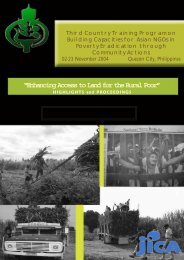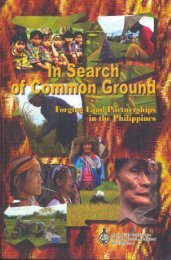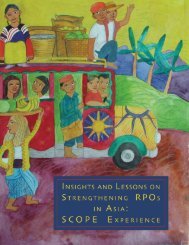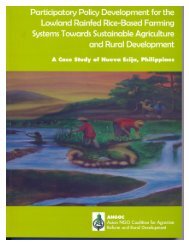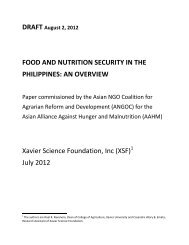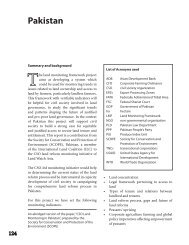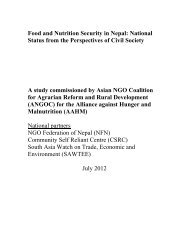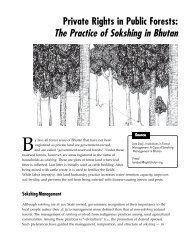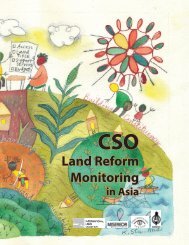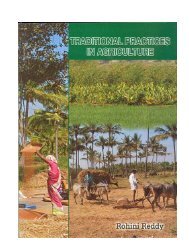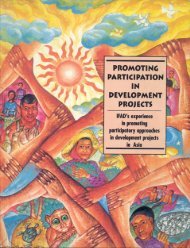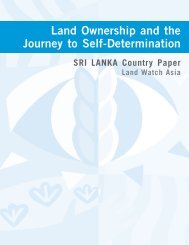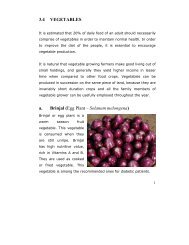Securing the Right to Land FULL - ANGOC
Securing the Right to Land FULL - ANGOC
Securing the Right to Land FULL - ANGOC
Create successful ePaper yourself
Turn your PDF publications into a flip-book with our unique Google optimized e-Paper software.
CAMBODIA<br />
Overview of Access <strong>to</strong> <strong>Land</strong><br />
<strong>Land</strong> management and administration in Cambodia can be<br />
traced back <strong>to</strong> its French colonial his<strong>to</strong>ry, particularly <strong>the</strong> Civil<br />
Code of 1920, which established <strong>the</strong> system of French land law<br />
that recognized private property rights.<br />
Though Cambodia gained its independence in 1954, an adequate<br />
land management system was not in place until <strong>the</strong><br />
1960s. Initially, few landholders sought <strong>to</strong> have <strong>the</strong>ir lands<br />
titled, in order <strong>to</strong> avoid <strong>the</strong> taxes <strong>the</strong>y would have had <strong>to</strong> pay as<br />
landowners. By <strong>the</strong> next decade, however, private property<br />
rights had started <strong>to</strong> be adequately documented, particularly<br />
through cadastral maps and land titles. By March 1970, when<br />
General Lon Nol’s coup d’etat successfully deposed Prince<br />
Sihanouk, many of <strong>the</strong> low-lying areas planted with rice had<br />
been claimed by private owners. Yet <strong>the</strong> change in government<br />
only resulted in <strong>the</strong> deterioration of <strong>the</strong> land management system<br />
for <strong>the</strong> next five years.<br />
In 1975, <strong>the</strong> Khmer Rouge Regime put all lands under state<br />
ownership, destroying all records, including cadastral maps and<br />
OVERCOMING A FAILURE OF LAW AND POLITICAL WILL<br />
QUICK FACTS<br />
61<br />
➤ Poverty is primarily a rural phenomenon. In<br />
2004, 91% of <strong>the</strong> poor lived in rural areas.<br />
➤ Forty (40) percent of households whose heads<br />
are engaged in agriculture are poor.<br />
➤ Incidence of land related conflicts: 1,551<br />
land disputes between 1991 and 2004,<br />
covering over 380,000 hectares and more<br />
than 160,000 farming families.<br />
➤ As of 2006, two-thirds of <strong>the</strong>se cases remain<br />
unresolved (2006 LICADHO Report).<br />
titles. Government employees involved in land management,<br />
registration and surveying who did not manage <strong>to</strong> leave <strong>the</strong><br />
country were re-deployed <strong>to</strong> <strong>the</strong> countryside or executed. In<br />
1979 <strong>the</strong> State of Cambodia organized <strong>the</strong> collective as <strong>the</strong> basis<br />
for claiming user rights <strong>to</strong> agricultural land: while residential<br />
use rights were allocated on <strong>the</strong> basis of occupation, ownership<br />
of land still remained in <strong>the</strong> hands of <strong>the</strong> State.<br />
Only ten years later, after <strong>the</strong> fall of <strong>the</strong> Khmer Rouge, did a<br />
1989 amendment <strong>to</strong> <strong>the</strong> Cambodian Constitution provide for a<br />
new private property system. According <strong>to</strong> Article 15 of <strong>the</strong><br />
Constitution, “Cambodian citizens shall enjoy fully <strong>the</strong> right <strong>to</strong><br />
own, use, bequeath, and inherit land granted by <strong>the</strong> state for<br />
<strong>the</strong> purpose of living on it and exploiting it.”<br />
Later, private property rights were also awarded under <strong>the</strong> <strong>Land</strong><br />
Law of 1992. However, this law failed <strong>to</strong> regulate <strong>the</strong> granting<br />
of land concessions and it wasn’t until 1998 that <strong>the</strong> Ministry<br />
of <strong>Land</strong> Management, Urban Planning and Construction<br />
(MLMUPC) was established <strong>to</strong> oversee <strong>the</strong> development of <strong>the</strong><br />
policy and regulate <strong>the</strong> awarding of land concessions. This ministry<br />
also coordinated land-use mapping and cadastral surveys,<br />
ASIAN NGO COALITION FOR AGRARIAN REFORM AND RURAL DEVELOPMENT



